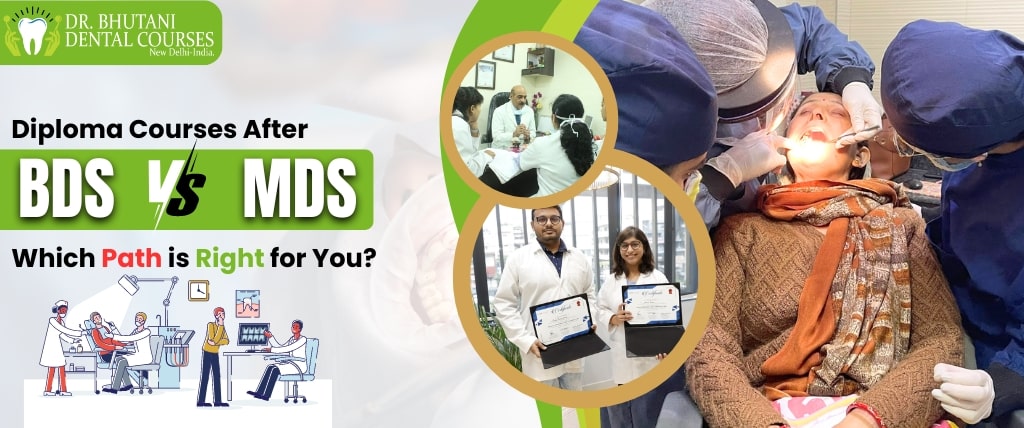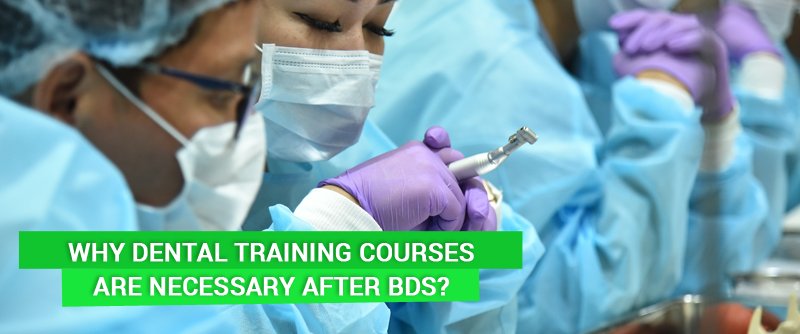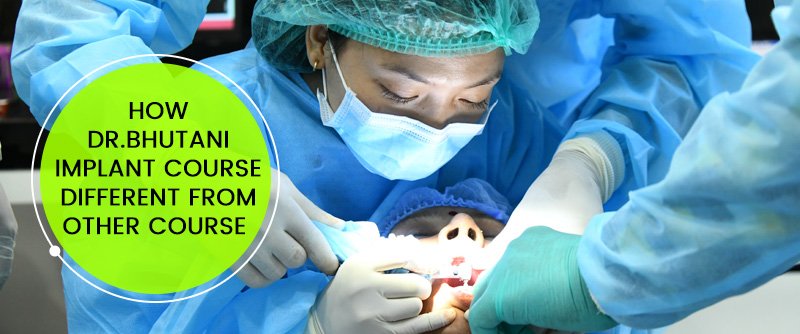It might be difficult to decide whether to pursue an MDS (Master of Dental Surgery) or a diploma after earning your BDS (Bachelor of Dental Surgery). While there are pros and disadvantages to each option, they also provide different career pathways and possibilities. To assist you in choosing the best course for you, we will outline the main distinctions between diploma programs after a BDS and an MDS degree in this post.
Understanding Diploma Courses After BDS
Diploma courses are short-term programs designed to provide specific skills and training in a particular area of dentistry. These courses usually last anywhere from 6 months to 2 years, depending on the program and specialization.
Key Features of Diploma Courses:
- Duration: Generally, diploma programs are shorter compared to MDS courses, lasting between 6 months and 2 years.
- Specialization Focus: Diploma courses are often more focused and skill-based, offering practical training in specific areas such as implantology, endodontics, orthodontics, or cosmetic dentistry.
- Cost-Effective: Diploma courses are more affordable compared to MDS programs, making them an attractive option for those who want to specialize without a long-term financial commitment.
- Less Competitive Admission: Diploma courses tend to have a less competitive admission process than MDS, allowing more students to enroll.
- Practical Orientation: The curriculum is typically more hands-on, enabling students to gain immediate practical experience in their chosen field.
Popular Diploma Courses After BDS:
- Diploma in Endodontics – Specializes in root canal treatments and restorative dentistry.
- Diploma in Implantology – Focuses on dental implants and related surgical procedures.
- Diploma in Orthodontics – Trains dentists in correcting dental irregularities using braces and aligners.
- Diploma in Cosmetic Dentistry – Covers aesthetic treatments like veneers, teeth whitening, and smile makeovers.
Pros of Choosing Diploma Courses:
- Quicker Entry into the Workforce: Because diploma programs are shorter in length, you can begin working in your specialty of dentistry much sooner.
- Targeted abilities: You will become adept in the specialization more rapidly since these programs place a strong emphasis on certain dental abilities.
- Reduced Financial Burden: Diploma programs are more reasonable for individuals on a tight budget because they often cost a lot less than MDS programs.
Cons of Choosing Diploma Courses:
- Restricted Scope: Diploma programs may not give you the wide theoretical understanding that an MDS degree does, and they frequently restrict you to particular areas of dentistry.
- Acknowledgment: A diploma might not be as prestigious or well-regarded as an MDS degree, which could have an impact on job prospects in higher education or in positions requiring advanced medical treatment.
Understanding MDS (Master of Dental Surgery)
MDS is a full-time postgraduate program that provides in-depth theoretical and practical training in various specializations of dentistry. The program typically lasts 3 years and is more academically rigorous compared to diploma courses.
Key Features of MDS:
- Duration: An MDS degree takes 3 years to complete, making it a more long-term commitment compared to diploma courses.
- Comprehensive Education: The MDS program covers both theoretical knowledge and practical training, providing a well-rounded education in dentistry.
- Research-Oriented: MDS involves conducting research and submitting a thesis, making it more suitable for those interested in academic or research careers.
- Higher Earning Potential: MDS graduates often command higher salaries compared to diploma holders due to the advanced level of education and expertise.
- Prestige and Recognition: An MDS degree is widely recognized and often required for higher-level positions in hospitals, academic institutions, and specialized clinics.
Popular Specializations in MDS:
- Oral and Maxillofacial Surgery – Deals with complex facial surgeries, trauma, and pathology.
- Prosthodontics – Focuses on restoring and replacing teeth with prostheses like crowns, bridges, and dentures.
- Orthodontics – Involves the correction of misaligned teeth and jaws.
- Periodontics – Specializes in the treatment of gum diseases and dental implants.
- Pedodontics – Focuses on pediatric dentistry and the care of children’s teeth.
Pros of Choosing MDS:
- Advanced Career Opportunities:More advanced job options are available to those with an MDS degree at academic institutions, hospitals, and specialty dentistry clinics.
- Greater Prestige: In the dentistry industry, MDS is regarded as a desirable degree that offers improved career stability and recognition.
- Comprehensive Learning: To prepare you for a wide range of dental concerns, the curriculum offers a thorough dive into both the theoretical and practical elements of dentistry.
- Teaching and Research Positions: An MDS degree is required if you want to work in teaching or dental research.
Cons of Choosing MDS:
- Longer Duration: The 3-year duration may be a disadvantage for those looking to enter the workforce quickly.
- Cost: MDS programs are expensive, and the financial commitment is significantly higher compared to diploma courses.
- More Competitive: Admission to MDS programs is highly competitive, often requiring a strong academic background and excellent entrance exam scores.
Diploma Courses vs. MDS: Which is Right for You?
The choice between diploma courses after BDS and an MDS degree largely depends on your career goals, financial situation, and the amount of time you are willing to invest in further education.
When to Choose Diploma Courses:
- If you’d want to start working right away and become an expert in a particular field of dentistry.
- If you’re searching for a less time-consuming and more inexpensive solution.
- If you would rather have training that is more hands-on and skill-based than very theoretical.
- If you’re seeking for a specialized job in an area like implantology or cosmetic dentistry.
When to Choose MDS:
- If you want to work at a research facility, an academic institution, or a famous dental hospital.
- If you’re searching for a thorough education that incorporates theory and practical application.
- If you’re ready to put in more time and money to pursue prospects for a more advanced profession and greater earning potential.
- If you want to work in dentistry as a specialist or in teaching and research.
Conclusion
Depending on your financial status, career path, and personal objectives, you may choose to pursue an MDS degree or opt for diploma courses after BDS. Diploma courses offer a fast-track specialization in specific fields, allowing you to quickly gain practical skills. On the other hand, an MDS provides a more comprehensive education, offering both theoretical and practical knowledge while unlocking broader career prospects. To ensure the best outcome for your professional journey, make an informed decision based on your long-term goals and how each option aligns with your career aspirations.Diploma Courses After BDS vs. MDS




